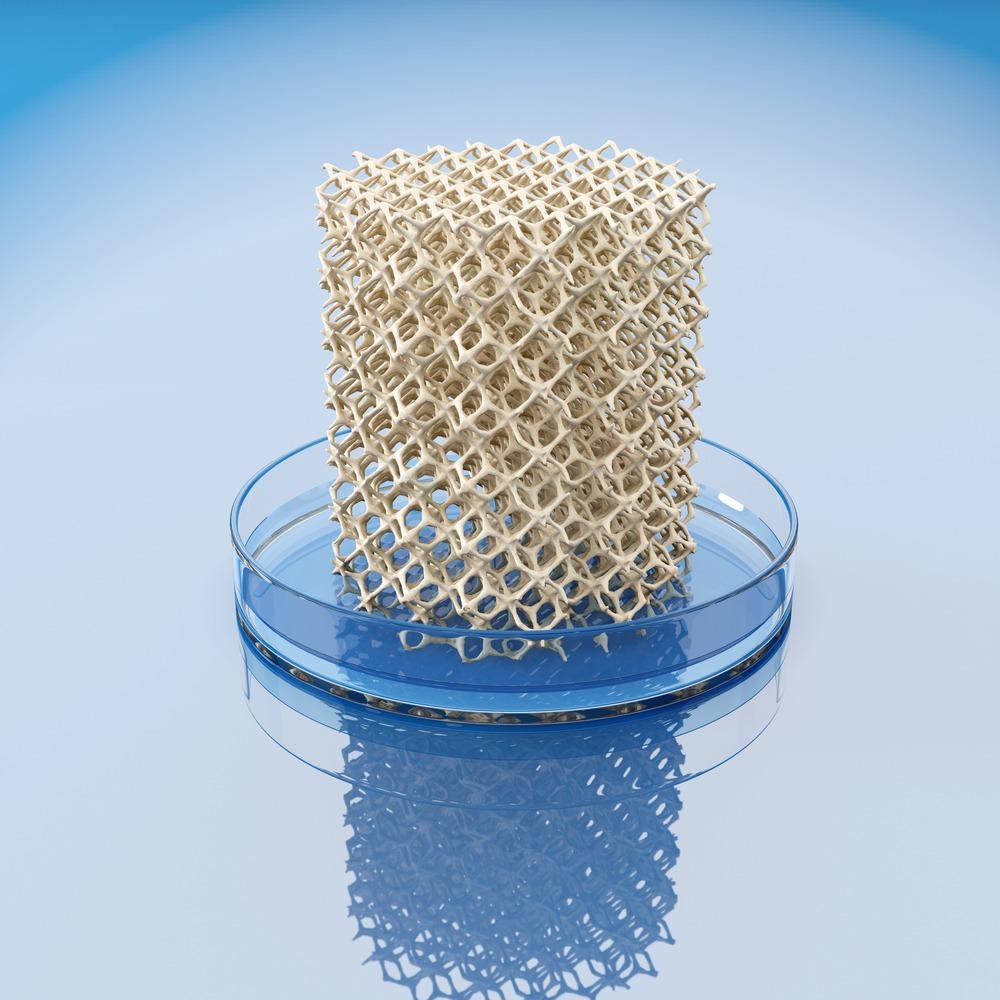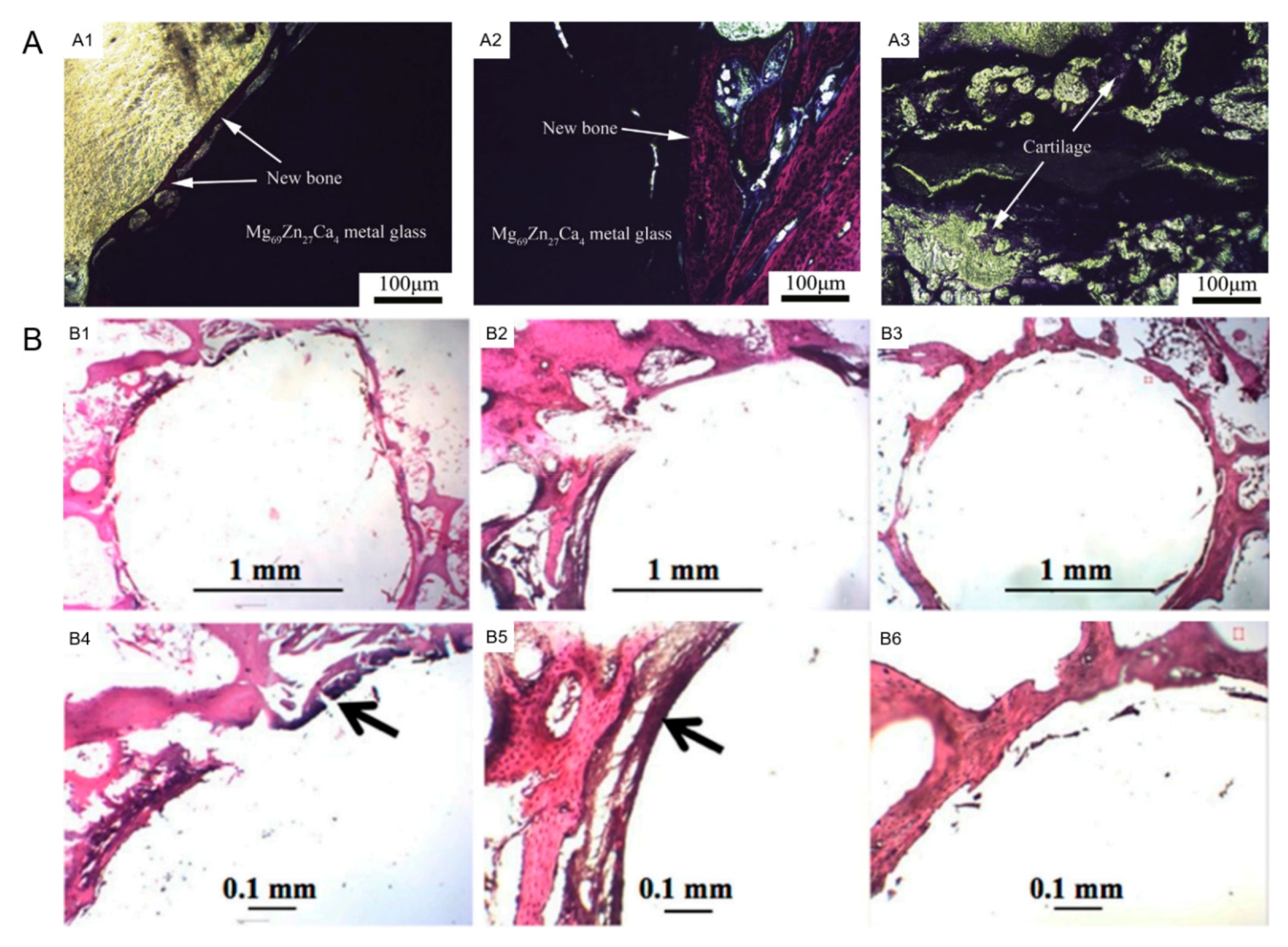A team of researchers from China has investigated the biocorrosion and biocompatibility of magnesium-based metallic glasses, with the aim of exploring their use as materials in biomedical applications. The research has been published online in the journal Materials.

Study: Biodegradable Mg–Zn–Ca-Based Metallic Glasses. Image Credit: Iaremenko Sergii/Shutterstock.com
Magnesium Alloys in Biomedical Research
Recent research interest has concentrated on the use of magnesium-based alloys for biodegradable biomedical applications due to their advantageous properties. These alloys possess comparable physical and mechanical properties to cortical bone, such as high strength and an equivalent Young’s modulus. Additionally, due to their biodegradability, it is not necessary to perform a second surgical intervention to remove implants.
Moreover, magnesium is a key mineral that is required by the human body for various biological functions such as bone growth and repair and the stabilization of genomic structures. Research has indicated that magnesium-based alloys are highly compatible, and this is implied by the fact that the recommended daily intake for adults of magnesium is between 240 and 420 mg per day.
Researchers have investigated and developed several applications utilizing magnesium-based alloys including cardiovascular stents, biodegradable implants, microclips for use in laryngeal microsurgery, and devices that aid in closing and repairing wounds.
Large volumes of hydrogen gas and localized changes in pH value at implant sites can occur due to the rapid etching speed of magnesium-based alloys. Alloying with elements such as Ca, Zn, Mn, Al, and rare earth elements can enhance corrosion resistance, and using excessive alloying elements can generate micro-galvanic couples with magnesium. Additionally, excess alloying can accelerate etching kinetics.
Metallic Glasses
The suppression of nucleation and the growth of crystalline phases in some alloy melts are used to form metallic glasses, which are chemically homogenous systems. Metallic glasses possess a long-range disordered structure due to the lack of regular, periodic crystal atom arrangements and grains or grain boundaries. Metallic glasses possess several beneficial properties, including high specific strength, hardness, superior corrosion and wear resistance, excellent magnetic properties, and polymer-like formability.

Tissue biocompatibility of Mg–Zn–Ca-based MGs. (A) VG photographs of bone defect repair for 2 months postoperation: (A1,A2) Mg69Zn27Ca4 MG, (A3) β-TCP (the red parts: new bone, the purple parts: cartilage),(B) Histological images of the implanted site at 24 weeks. (B1,B4) Mg60Zn35Ca5 MGMC; (B2,B5) Ti6Al4V alloy; (B3,B6) PLA. Black arrows indicate new bone formation (hematoxylin and eosin staining). Image Credit: Jin, C et al., Materials
These properties have made metallic glasses attractive research targets. Moreover, their relatively flexible composition with alloying contents far beyond the solubility makes them especially interesting materials. The lack of solubility limits greatly enhances the corrosion resistance of metallic glasses. On the other hand, galvanic effects are avoided by a lack of secondary phases and microstructural defects.
However, a common issue with metallic glasses is their biocompatibility. Most magnesium-based metallic glasses contain elements such as copper, nickel, or gadolinium, which limits their biomedical applications. Amongst the various proposed magnesium-based metallic glasses, only those with Mg-Cu-Y-Zn and Mg-Zn-Ca chemical structures have displayed the potential for biomedical applications. Histopathological analysis and cytotoxicity tests have confirmed that Mg-Zn-Ca possesses high biocompatibility, and these metallic glasses have been the only target of serious research.
However, limitations have been identified in research into magnesium-based metallic glasses, including their lack of plastic strain, which makes processing difficult. Strategies such as developing matrix composites, using surface treatments, and minor alloying additions have been investigated to enhance the properties of these materials and overcome their limitations.
The Study
In recent years, there has been intense research focus on biodegradable magnesium-based crystalline alloys, with clinical trials already performed into their development. However, research into biodegradable magnesium-based metallic glasses is still in its infancy. Over the past decade, however, research has progressed rapidly into the field of biomedical magnesium-based metallic glasses.
The aim of the study is to provide a timely review of current progress and future perspectives on the research and development of biomedical Mg-Zn-Ca metallic glasses. The authors have investigated the biocompatibility (both cellular and tissue,) biocorrosion, mechanical properties, and microstructure of the materials. A comprehensive review of current literature has been performed by the authors, with one hundred and twenty-two studies investigated.
The review highlighted several attractive properties, including good tissue and cellular biocompatibility, stability at human body temperature, and fatigue properties that meet the quantification requirements of biomaterials. One observation was that surface treatment with micro-arc oxidation can encourage apatite formation, which can prevent corrosive ions from entering coatings by filling micropores on the outer layer of the materials, thus improving corrosion resistance.
Owing to the reported properties of magnesium-based metallic glasses, a main discussion in the research is on the potential of these materials for constructing biodegradable implants. Additionally, the authors have investigated future perspectives for the field, including fabrication routes, structure and composition design, and approaches for reinforcing materials and devices.
Based on the findings of their review, the authors have stated that biodegradable Mg-Zn-CA metallic glasses are attractive candidates for temporary implants due to their enhanced mechanical and physical properties, biocorrosion resistance, and biocompatibility compared to crystalline magnesium. Strategies such as surface coating can improve their properties, but there are still some challenges that need to be overcome before these materials can be considered for clinical applications.
Further Reading
Jin, C et al. (2022) Biodegradable Mg–Zn–Ca-Based Metallic Glasses [online] Materials 15(6) 2172 | mdpi.com. Available at: https://www.mdpi.com/1996-1944/15/6/2172
Disclaimer: The views expressed here are those of the author expressed in their private capacity and do not necessarily represent the views of AZoM.com Limited T/A AZoNetwork the owner and operator of this website. This disclaimer forms part of the Terms and conditions of use of this website.